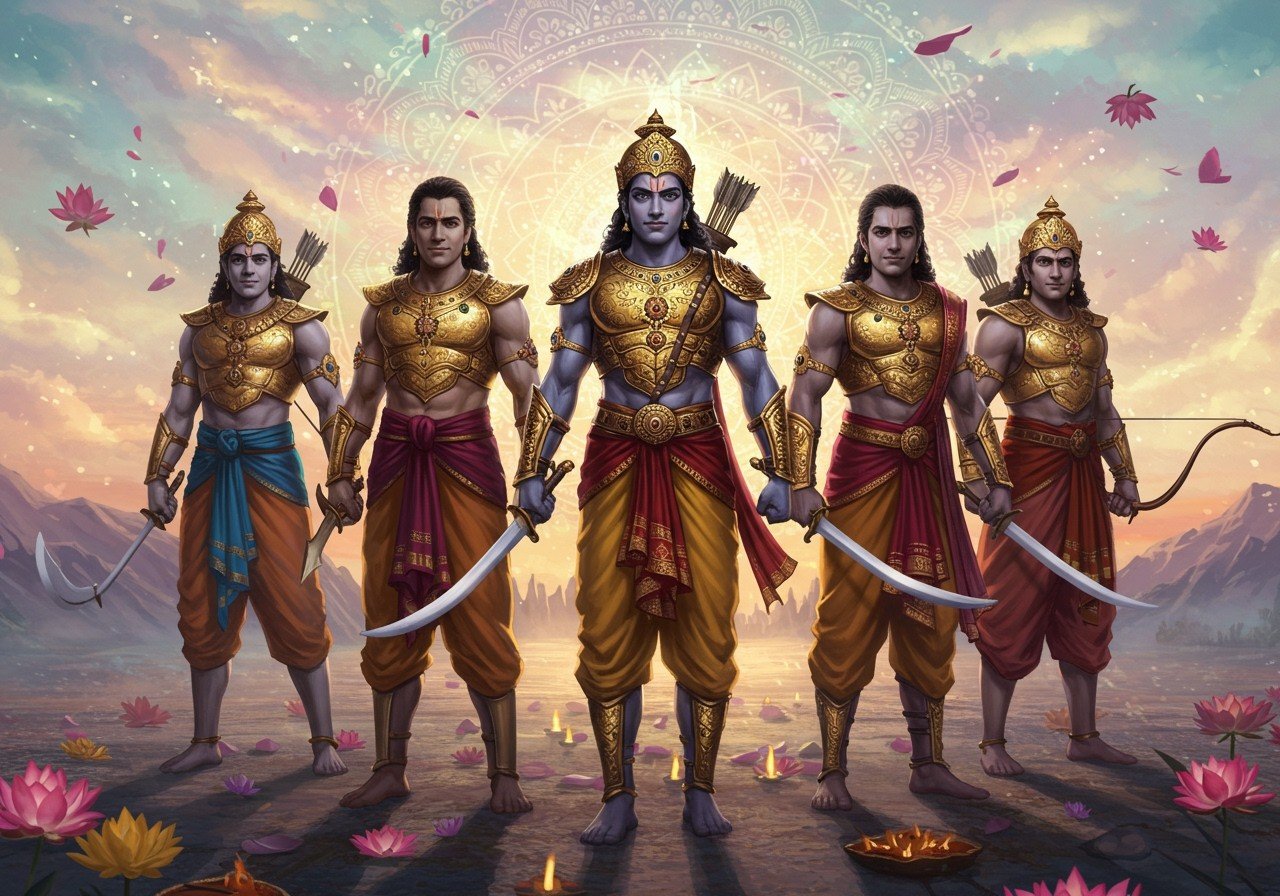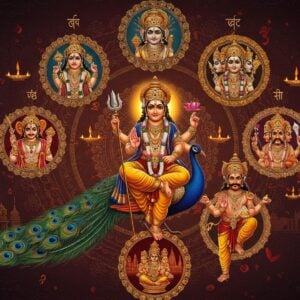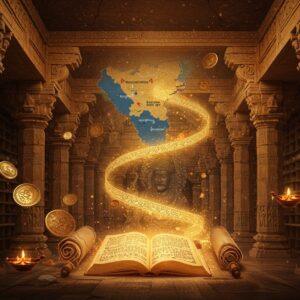
The Mahabharata, a saga of intricate characters and narratives, presents Karna as a paragon of bravery and a figure of profound tragedy. Yet, his sons often remain shrouded in relative obscurity. Their lives and contributions, however, form an integral part of the epic’s tapestry, adding depth and complexity to the overall narrative. Let us embark on a journey to explore their roles, their destinies, and the legacies they left behind.
Family and Lineage of the Great Karna
Karna, a pivotal character in the Mahabharata, emerges from a unique and complex background. Born to Kunti, he was raised by a charioteer, Adhiratha, which imbued him with a blend of noble lineage and humble upbringing. His wives, Vrushali and Supriya, played significant roles in his life. While some texts mention only Vrushali, adding layers to understanding Karna’s personal life beyond the battlefield is necessary. They bore him several sons, whose depictions vary across different versions and adaptations of the epic. This exploration aims to shed light on these variations, adding a nuanced understanding of Karna’s lineage.
Karna’s complex lineage significantly shaped his sons’ destinies in the epic. Despite his upbringing as a charioteer’s son, Karna possessed the inherent qualities of a noble warrior. This duality of identity wove a complex tapestry for his family and lineage, impacting his sons’ roles in the unfolding drama of the Mahabharata. Among them, Vrishasena and Vrishaketu stand out. Each possessed unique attributes and played distinct roles in the grand narrative. Delving into their individual stories allows us to appreciate the cultural and social significance of these characters within the vast panorama of the Mahabharata.
Unveiling the Names and Destinies of Karna’s Sons
The sons of Karna, much like their father, bear tales that deserve to be told and retold. Each played a unique role, shaped by their father’s influence and the values he instilled in them. Understanding their stories is essential to grasping the broader narrative and appreciating the complexities of Karna’s legacy. Their stories illuminate the intricate web of relationships, loyalties, and sacrifices that defined the Mahabharata.
-
Vrishasena, the eldest, was a warrior of remarkable prowess. His bravery in the Kurukshetra War solidified his place as a key figure in the epic. Fighting valiantly alongside his father, he displayed exceptional martial skills and unwavering loyalty. Vrishasena’s tragic end at the hands of Arjuna marks a poignant chapter in the Mahabharata, reflecting the cyclical nature of violence and fate. His courage and unwavering dedication to his father are remembered, mirroring Karna’s own traits. This paternal influence underscores the importance of lineage and upbringing in shaping individual destinies.
-
Vrishaketu, the youngest, occupies a unique position in the narrative. Unlike his brothers, he survived the devastating war. Following the conflict, he allied himself with the Pandavas, a significant turn of events that added layers of complexity to the narrative. His interactions with Arjuna, unaware of their familial connection during the war, reveal the intricate web of relationships and the unexpected paths to reconciliation. Vrishaketu’s survival symbolizes hope and the possibility of a future beyond conflict. His journey underscores the themes of forgiveness, continuity, and the enduring power of familial bonds, even amidst the ravages of war.
-
Sushena, another prominent son, fought with valor but met his end facing Nakula. Chitrasena and Satyasena, too, met their fate in the heat of battle, both slain by Nakula. Banasena perished at the hands of Bhima, while Satyaki felled Prasena. Shatrunjaya and Dvipata fell to Arjuna’s arrows. The fates of these sons, intertwined with the larger narrative of the war, underscore the devastating impact of conflict and the profound losses suffered on both sides. Each son’s story, though often brief, contributes to the epic’s depth and dramatic intensity, painting a vivid picture of the war’s far-reaching consequences.
Vrishasena: A Saga of Valor
Vrishasena’s life is a testament to his father’s influence. Under Karna’s tutelage, he mastered the art of warfare. His role in the Kurukshetra War stands out for its intensity and unwavering loyalty to his father. On the 14th day of the battle, he showcased his extraordinary prowess by defeating Drupada and Dhrishtadyumna, two seasoned warriors of the Pandava army. This victory demonstrated his exceptional skills and solidified his reputation as a formidable warrior.
Vrishasena’s final confrontation with Arjuna marks a pivotal moment in the Mahabharata. Despite his valor and skill, he could not overcome Arjuna’s superior might. This tragic event deeply affected Karna, highlighting the poignant themes of loyalty, loss, and the agonizing sacrifices demanded by war. Vrishasena’s tale adds profound layers to the epic’s exploration of dharma and the complexities of familial bonds, reminding us of the human cost of conflict.
Vrishaketu: A Legacy of Reconciliation
Vrishaketu stands as a symbol of hope and continuity, bridging the divide between rival factions in the aftermath of the war. As Karna’s sole surviving son, his journey extends beyond the battlefield, embodying the possibility of reconciliation and a new beginning. Under the patronage of the Pandavas, he assumed leadership of the kingdom of Anga, marking a significant transition in his life. His interactions with Arjuna, marked by newfound kinship and respect, highlight the transformative power of forgiveness and the potential for healing after conflict.
Vrishaketu also inherited knowledge of divine weapons, including the formidable Brahmamastra, Brahmsirastra, and Vaishnavastra. However, Krishna, recognizing the destructive potential of such weapons, forbade him from sharing this knowledge, ensuring that their secrets remained guarded. This act emphasizes the importance of wisdom and restraint in wielding power. Vrishaketu’s survival and his subsequent integration into the Pandava fold underscore the themes of reconciliation, the cyclical nature of time, and the enduring legacy of familial connections, even amidst the scars of war. His story offers a glimmer of hope for a future shaped by peace and understanding.
The Enduring Legacy of Karna’s Sons
The stories of Karna’s sons hold a significant place within Indian cultural and literary traditions. They embody the virtues of valor, loyalty, and tragic heroism that are central to the Mahabharata’s enduring appeal. Their narratives have influenced countless adaptations and retellings, providing valuable insights into the complexities of dharma and the pursuit of social justice. They serve as reminders of the profound impact that individual choices can have on the larger tapestry of history. Explore relevant stories from our collection to enhance your understanding of these characters.
Even today, Karna’s sons continue to resonate with audiences. Their lives offer valuable lessons about courage, loyalty, and the intricate nature of human relationships. Their legacy challenges conventional societal norms, emphasizing that true nobility stems from one’s actions and character rather than birthright. By exploring these characters, we gain a deeper appreciation for the Mahabharata’s rich tapestry and enduring cultural significance.
Poojn.in: Your Gateway to Exploring Karna’s Sons
At poojn.in, we offer a wide array of authentic ritual items and cultural products that can enrich your connection to the stories of Karna’s sons. Our collection allows you to discover items that resonate with their legacies and the values they represent. We offer a diverse range of products, making it easy to find something that resonates with your spiritual journey.
-
Books and Scriptures: Deepen your understanding of these legendary figures through our curated selection of books and scriptures. Discover texts that delve into their lives, their roles in the Mahabharata, and their contributions to Hindu mythology. Enhance your puja experience with authentic Kasturi.
-
Puja Kits: Honor these iconic characters through traditional rituals with our thoughtfully curated puja kits. Each kit contains all the essential items you need to perform ceremonies at home, making it convenient and accessible to connect with these powerful narratives. Dress your Laddu Gopal in pure cotton attire or festive Janmashtami dresses from our collection.
-
Idols and Figurines: Adorn your home with beautifully crafted idols and figurines depicting key characters from the Mahabharata. These serve as a constant reminder of their valor, their sacrifices, and the timeless lessons they embody. Create a sacred space with a Gongadi Asan.
-
Yagna Essentials: Partake in yagnas and other sacred rituals using our high-quality yagna essentials. Invoke blessings and pay homage to the great warriors of the Mahabharata through these ancient practices. We offer a complete range of products to support your spiritual journey and help you create a sacred and meaningful experience. Find the perfect Krishna idol, camphor dani, hand pakha, or Maa Kali Khara for your puja needs.
Poojn.in provides more than just authentic products; it offers a convenient and reliable way to deepen your spiritual journey. Visit our website www.poojn.in or connect with us at 03369029784 or via WhatsApp at +91-9476142738 to discover how we can help you explore the rich heritage of Karna’s sons.
Reflections on the Sons of Karna
The sons of Karna leave an enduring mark on the vast narrative of the Mahabharata. Their stories transcend mere tales of battle and bravery; they offer profound insights into the values and teachings of their father. Each son, with his unique journey, enriches the epic with themes of courage, sacrifice, and the complexities of human relationships. They remind us of the enduring power of love, loyalty, and the search for meaning in a world filled with conflict.
Through Vrishasena’s unwavering valor and Vrishaketu’s path towards reconciliation, we witness the enduring spirit of Karna reflected in his offspring. These narratives offer invaluable lessons from the Mahabharata, urging us to reflect on our own values and actions. By honoring their legacy, we gain a deeper understanding of dharma and the rich cultural heritage they represent. Their lives remind us that true heroism lies in the choices we make and the impact we have on the world around us.
In remembering Karna’s sons, we celebrate their contributions to a timeless epic that continues to inspire and teach generations. Their stories serve as a powerful reminder that true greatness lies not in one’s birth or circumstances, but in the values we uphold and the legacy we leave behind.
Frequently Asked Questions about Karna’s Sons
What are the names of Karna’s sons? Karna had nine sons, with Vrishasena, Sushena, and Vrishaketu being the most prominent. Other sons include Chitrasena, Satyasena, Shatrunjaya, Dvipata, Banasena, and Prasena.
Who killed Vrishasena? Arjuna killed Vrishasena on the 17th day of the Kurukshetra War. This event is particularly poignant because it occurred just before Karna’s own death.
Who was Vrishaketu’s mother? While some texts primarily mention Vrushali, Karna’s first wife, as the mother of his children, the Mahabharata’s complex narrative leaves room for varying interpretations. Some versions mention other wives. Clarifying Vrishaketu’s parentage requires delving into different adaptations of the epic.
What happened to Vrishaketu after the war? Vrishaketu, Karna’s youngest son, was the only one to survive the Kurukshetra War. After the war and Karna’s true parentage was revealed, he was taken under the wing of the Pandavas, particularly Arjuna. He eventually became the king of Anga, Karna’s kingdom.
How did Karna’s sons contribute to his legacy? Karna’s sons, through their participation in the Kurukshetra War, particularly Vrishasena’s valor and Vrishaketu’s survival and subsequent reconciliation with the Pandavas, added another layer to Karna’s complex legacy. Their stories helped solidify his image as both a great warrior and a father who instilled loyalty and bravery in his sons.
Why is less known about Karna’s other sons? The Mahabharata, while a comprehensive epic, focuses primarily on the major characters and pivotal events. The stories of Karna’s other sons, while relevant, are often overshadowed by the main narrative, resulting in fewer details about their individual lives and contributions.
What was the role of Karna’s sons in the Kurukshetra War? Most of Karna’s sons fought on the side of the Kauravas in the Kurukshetra War. Their participation reflected their loyalty to their father and their adherence to the duties dictated by their social position. Their presence on the battlefield added to the complexity of the war’s narrative, intertwining personal loyalties with the larger conflict.


